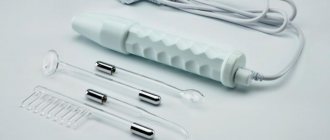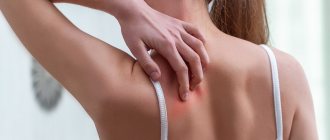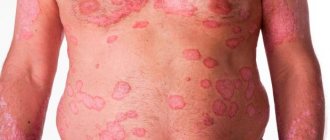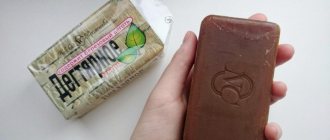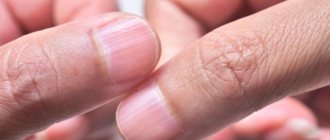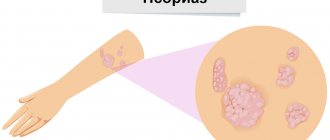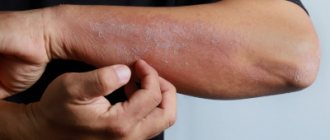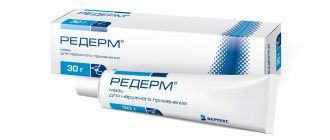Causes
The exact cause of psoriasis is unknown. Genetic predisposition plays a significant role in its development: approximately 40% of patients with psoriasis or psoriatic arthritis have a family history of the disease (the presence of psoriasis in close blood relatives).
The development and course of the disease are also influenced by lifestyle, environmental factors and habits: smoking, excess weight, taking certain medications (beta blockers, lithium, antimalarial drugs), infections, alcohol, stress.
Injections for exacerbation of psoriasis
If necessary, a dermatologist prescribes various injections to stop the exacerbation of psoriasis. Most often, a specialist prescribes injections of drugs such as:
- Immunomodulators. After the administration of these drugs, metabolic processes in the cells are stabilized. In addition, immunomodulators relieve inflammation, activate the immune system and have a desensitizing effect.
- Hepatoprotectors . The products provide antioxidant, regenerative and detoxifying effects. During antipsoriatic therapy, there is a large load on the liver, so it is important to support its work during an exacerbation.
- Antihistamines help relieve itching due to psoriasis. In addition, these drugs have decongestant, sedative and anesthetic effects. After the injections, itching, skin irritation and pain go away.
Treatment of psoriasis
Existing treatment methods help cope with exacerbations, prolong periods of remission and significantly improve the quality of life of patients. However, psoriasis cannot be completely cured; even with long-term good condition, repeated exacerbations are possible.
In the treatment of psoriasis, medications for external use (lotions, creams, ointments, shampoos for the scalp), as well as systemic therapy, are used.
The choice of treatment method depends on the severity of the disease, localization and extent of the process, the presence of concomitant diseases, individual response to previous treatment, and the patient’s capabilities and desires.
Features of treatment
Area-limited psoriasis in most cases requires only external therapy. It includes the use of the following groups of drugs:
- glucocorticosteroids;
- vitamin D analogues;
- retinoids;
- calcineurin inhibitors;
- tar preparations.
In more severe cases, in addition to external therapy, systemic therapy and phototherapy are used.
The following groups of drugs are used for systemic therapy of psoriasis:
- retinoids;
- immunosuppressants (methotrexate, cyclosporine, apremilast);
- genetically engineered biological products.
How is psoriasis treated at the Rassvet clinic?
The dermatologist conducts a full examination of the patient’s skin, nails, hair and mucous membranes, collects anamnesis and, based on the data obtained, makes a diagnosis. In the vast majority of cases, additional manipulations and studies are not required. Sometimes a skin biopsy is performed to clarify the diagnosis. If you suspect the presence of concomitant diseases, you may need to consult other specialists (general practitioner, rheumatologist, ophthalmologist).
Diet for exacerbation of psoriasis
A proper diet plays an important role in the treatment and remission of the disease. It is based on maintaining the acid-base balance in the body. In this case, the alkaline reaction must be greater than the acidic one. Therefore, the daily diet of foods should consist of 60-70% alkali-forming and 25-35% acid-forming foods.
First of all, alkaline-forming foods include vegetables and fruits, and acid-forming foods include foods that contain starch proteins, as well as meat and meat products, cream, cheese, and potatoes. In addition, nutrition for psoriasis involves drinking large amounts of water: patients are recommended to drink 7-10 glasses per day. It is best to drink purified distilled water and freshly squeezed juices.
It is important that three parts of the daily diet consist of fresh fruits and vegetables. First of all, patients should pay attention to salads made from carrots, beets and cabbage. In addition, it is important to add celery, garlic, onions, cumin, dill, and cucumbers to the basis of the diet. Another part of your diet should include a variety of proteins, such as seeds, raw nuts, egg whites and lean meats. For sweets, it is better to choose dates, dried apricots or raisins.
When psoriasis worsens, it is important to minimize or completely eliminate foods such as:
- vinegar;
- mayonnaise;
- margarine and spread;
- semi-finished products;
- various sweets;
- sausages;
- canned food;
- fried, smoked, baked fish;
- crackers and chips;
- fast food;
- sugar;
- white wheat bread;
- spices and seasonings;
- caviar;
- soy sauce;
- egg yolk;
- fat meat;
- foods high in purines, such as dried porcini mushrooms, yeast
If you have an allergy, it is also recommended to exclude nuts.
How long does the exacerbation last?
Psoriasis cannot be cured, but its symptoms disappear only for a certain period of time. The main thing that the doctor and the patient himself must do is to achieve the longest possible remission, during which the skin disease practically does not make itself felt.
If you neglect lichen planus, or ignore the factors and signs of its reoccurrence, then exacerbations can occur 2-3 times a year and last at least 15–20 days.
We hope you will be able to go into stable remission and not think about psoriasis for many years. But if the disease has worsened, we advise you to pay attention to Rederm ointment. This remedy, based on a combination of salicylic acid and betamethasone, has pronounced anti-inflammatory, antipruritic, antiallergic, and keratolytic effects.
crbhotimsk.by
Psoriasis is a chronic skin disease characterized by exacerbations and relapses (repeated occurrences of the disease). The basis of psoriasis is a violation of the normal development of skin cells - keratinocytes.
The prevalence of psoriasis in the world is estimated at about 1-3% of the population. In Europe, it affects up to 5 million people, which is comparable to the incidence of coronary heart disease and diabetes mellitus.
Causes of psoriasis:
Psoriasis develops for two reasons: malfunctions of the immune system and pathological (uncontrolled) cell division, determined genetically.
Provoking factors are:
Stress is physical (hypothermia or overheating) and emotional (depression, chronic fatigue, nervous tension).
Dry skin type, its pathological thinning as a result of improper care.
Systematic skin irritation, chemical or mechanical.
Uncontrolled use of certain medications.
Chronic infectious and fungal infections.
At risk are people who abuse alcohol, smoking, drugs, allergies, overweight people, and workers in hazardous working conditions.
There is a high risk of illness in children whose parents have psoriasis.
The relationship between psoriasis and the nervous system is quite complex, more like a vicious circle and has the character of a bipolar model. On the one hand, stress and prolonged nervous overstrain lead to an exacerbation of the process, and on the other, the condition of the skin itself (the presence of psoriatic rashes) causes anxiety in the patient, leads to the development of chronic stress, which, in turn, worsens the course of the disease and closes this vicious circle.
The disease primarily affects the skin, which manifests itself as red rashes with a characteristic inflammatory reaction. At the same time, the plaque is covered with silvery scales on top. The main difficulty in treating the disease is the lack of drugs for a complete cure. It is assumed that the main factors influencing the spread of psoriasis are: metabolic abnormalities, external factors, stress, and heredity.
Basic methods of preventing psoriasis Psoriasis affects both men and women equally often. Although higher amounts of the sex hormone estrogen make women more prone to autoimmune diseases. Often, an outbreak of the disease occurs precisely during a period of hormonal surge: adolescence, menstruation.
Where to contact
Most often, psoriasis first appears on the skin, although it can also affect other organs. If you find red, swollen plaques covered with whitish scales on your skin, you need to see a doctor to find out the cause. The sooner you are diagnosed and treated, the easier it will be to control the progression of psoriasis.
Psoriasis mainly appears on the elbows and knees, feet and palms, skin of the torso and head. The areas may be small or merge together and sometimes itch and bleed. Often the disease affects the nails, which can thicken, contain irregularities in the form of dents and grooves, change color and peel off, and depressions appear - so this is also worth paying attention to.
With psoriasis, the skin especially needs gentle care, because excess dead cells need to be removed. In water, this can be done as gently as possible, using mild cleansers and a soft sponge so as not to damage the skin. In this case, the water should be at a comfortable temperature - too hot or cold irritates the skin.
After a bath or shower, be sure to moisturize your entire body with oils and creams. If your skin gets dry during the day, you can moisturize your skin as often as needed.
It is important to avoid microtraumas, not to scratch or damage the skin, and to choose soft, non-prickly clothing and bedding. Natural materials are preferred; synthetics often cause irritation. It is advisable not to use fabric softeners, and choose washing powder as soft as possible, for example, for children's clothes.
It is also better to choose a job where you do not have to wear a rough uniform or interact with chemicals. Try to protect your skin from household chemicals and cuts during cooking, and wear gloves when cleaning.
Psoriasis is a disease that requires thoughtful treatment, otherwise it will begin to cause discomfort. Find your treatment center for this disease so as not to start the disease
Less stress
They say that all diseases are caused by nerves. There is some truth in this - stress really provokes many diseases, and psoriasis is no exception. Try to worry less and avoid what causes such a reaction. You have to live with psoriasis, so you need to ensure as much rest as possible. Be sure to get a good night's sleep, because chronic lack of sleep is stressful for the whole body.
Many patients suffer from depression and are embarrassed about their body. Contacting a psychologist will help solve this problem and you will feel better.
Lifestyle change
Ultraviolet usually helps with psoriasis - it is even prescribed as the main therapy, but with a certain wavelength to get maximum effect and minimum harm. You can sunbathe yourself, but protect and moisturize your skin very moderately and thoroughly. It is very sensitive, and instead of benefit, you can get a slight burn, exacerbation of psoriasis, or even the development of skin tumors.
A little sports and walks in the fresh air will improve your health, and your mood will be high. And this is important when dealing with stress. You need to create a comfortable atmosphere at home - do wet cleaning more often and humidify the air. Skin with psoriasis dries quickly, and additional air humidification will not hurt. There are special humidifiers, but home flowers, an aquarium or spraying also help.
Quitting bad habits, tattoos and piercings
It is better to completely eliminate smoking and alcohol. Also, do not take any medications without a special prescription from a doctor, as they can also give rise to an exacerbation of the disease. When prescribing medications, tell your doctor that you have psoriasis - your treatment may need to be adjusted.
You should not decorate your body with tattoos or piercings, even if the severity of your psoriasis is mild. If one of your relatives is sick and you are spared psoriasis, a tattoo may trigger the onset of the disease, since it is possible that you are hereditarily predisposed to autoimmune diseases. Any injury to the skin with psoriasis is dangerous, and when tattooing, the damage is quite serious. Dyes also contribute.
Boosting immunity
It is necessary to get rid of all chronic active or dormant infections so that they do not provoke an exacerbation of psoriasis. Even simple tooth decay or a cold can reduce immunity. To increase it in the warm season, you can harden yourself, and during periods of mass diseases, avoid crowds of people and not get too cold.
Medications
Sometimes following the rules does not help and you have to resort to medication, especially in severe stages of psoriasis.
At the initial stages, special ointments are used. As the disease progresses, physical therapy and systemic drug therapy may be added. Do not self-medicate under any circumstances and follow the dosages prescribed by your doctor. Do not use an unfamiliar drug without consulting a doctor.
The most important thing in the treatment of psoriasis is constant therapy, which must be carried out under the close supervision of a doctor. We will help you choose the most convenient clinic for consultation
You can live with psoriasis
Unfortunately, it is not yet possible to cure psoriasis once and for all. Therefore, it is important to learn to live with the disease, minimizing its impact on health and well-being as much as possible. If you prevent psoriasis from progressing to severe stages, even periods of exacerbations will be easier to bear.
Unlike genetics, external factors can be influenced. If you follow all the recommendations of your doctor and simple tips, remission - the period when the disease recedes - will last longer and the quality of life will improve.
It is important to spread information among family and friends that psoriasis is not contagious. Many psychological problems of patients are associated with the myth about the infectiousness of psoriasis. The more people know about the disease, the more
It will be more comfortable to live for those who live with psoriasis.
Prevention of psoriasis consists of maintaining a healthy lifestyle and eliminating negative factors. At the same time, prevention has a fairly general form, that is, it allows you to prevent the development of other diseases, since the immune system is strengthened, and the body functions normally, the likelihood of qualitatively resisting environmental irritants increases.
Prevention is a set of measures aimed at maintaining health in the body. There are several areas of influence that help prevent relapses:
1. High-quality skin care;
2. Stick to a diet;
3. It is recommended to have a relaxing massage;
4. Giving up bad habits;
5. Avoid stress and depression;
6. Prevent contact of caustic chemicals with skin and respiratory tract;
7. Maintain proper levels of microelements and vitamins in the body.
Skin care
High-quality and thorough skin care is necessary:
1. Carry out water procedures periodically, even during the cold season. For hot times, you can use a cool shower, douches, and during the cold season, use warm baths with the addition of soda, salt, herbs, etc.;
2. It is important to carefully care for the skin so as not to provoke irritation and cuts on it. Use soft sponges, but it is better to avoid hard ones altogether, otherwise a relapse is possible;
3. Eliminate hard soaps from use. Also prevent the ingress of solvents, such as gasoline, kerosene; 4. It is better to wash your hair with special shampoos that inhibit the spread of the disease and can act as a treatment for psoriasis. This includes shampoos, conditioners, and lotions;
5. Prevent skin cracking to eliminate the possibility of symptoms. After taking a bath or shower, it is important to moisturize the skin, use masks, creams, ointments, etc. for this. This accelerates the restoration of the hydrolipid membrane and prevents increased water loss. It is necessary to use such products once a day;
6. The humidity in the room should be at the optimal level (50-55%). If the air is too dry, the skin begins to dry out and eventually crack. Humidifiers can be used;
7. Increased air circulation increases dry skin, this applies to air conditioners and drafts. It is necessary to limit the time spent in such premises; 8. Mechanical damage should be excluded. Cuts, bruises, abrasions, and tears in the skin often provoke a relapse;
9. Chemical products, for example, for bathroom cleaning, should be used minimally and only with personal protective equipment, although even prolonged exposure to the respiratory tract is harmful;
10. Trim nails short to prevent accidental injury to the skin;
11. Some types of cosmetics contain aggressive substances, which negatively affect the skin. You may have to switch to medical cosmetics.
